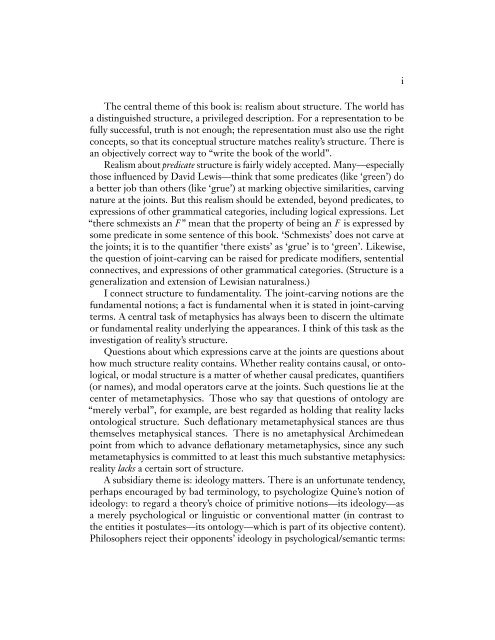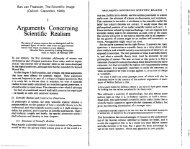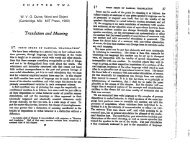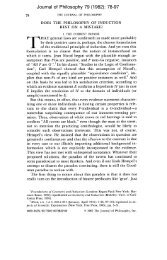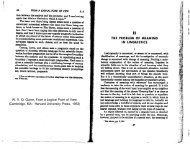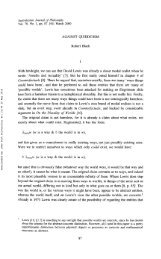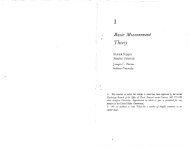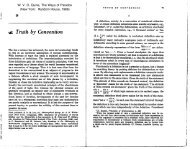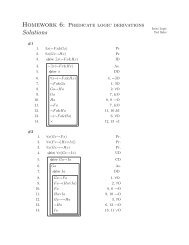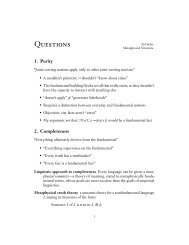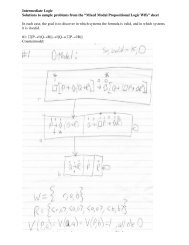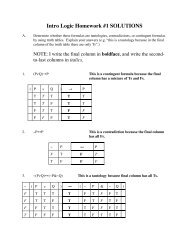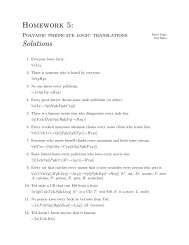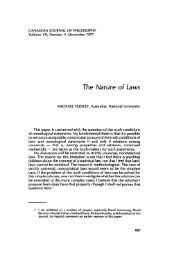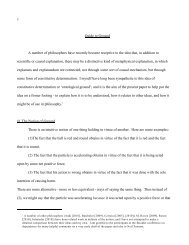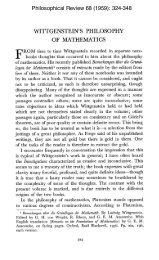Writing the Book of the World - Ted Sider
Writing the Book of the World - Ted Sider
Writing the Book of the World - Ted Sider
You also want an ePaper? Increase the reach of your titles
YUMPU automatically turns print PDFs into web optimized ePapers that Google loves.
The central <strong>the</strong>me <strong>of</strong> this book is: realism about structure. The world has<br />
a distinguished structure, a privileged description. For a representation to be<br />
fully successful, truth is not enough; <strong>the</strong> representation must also use <strong>the</strong> right<br />
concepts, so that its conceptual structure matches reality’s structure. There is<br />
an objectively correct way to “write <strong>the</strong> book <strong>of</strong> <strong>the</strong> world”.<br />
Realism about predicate structure is fairly widely accepted. Many—especially<br />
those influenced by David Lewis—think that some predicates (like ‘green’) do<br />
a better job than o<strong>the</strong>rs (like ‘grue’) at marking objective similarities, carving<br />
nature at <strong>the</strong> joints. But this realism should be extended, beyond predicates, to<br />
expressions <strong>of</strong> o<strong>the</strong>r grammatical categories, including logical expressions. Let<br />
“<strong>the</strong>re schmexists an F ” mean that <strong>the</strong> property <strong>of</strong> being an F is expressed by<br />
some predicate in some sentence <strong>of</strong> this book. ‘Schmexists’ does not carve at<br />
<strong>the</strong> joints; it is to <strong>the</strong> quantifier ‘<strong>the</strong>re exists’ as ‘grue’ is to ‘green’. Likewise,<br />
<strong>the</strong> question <strong>of</strong> joint-carving can be raised for predicate modifiers, sentential<br />
connectives, and expressions <strong>of</strong> o<strong>the</strong>r grammatical categories. (Structure is a<br />
generalization and extension <strong>of</strong> Lewisian naturalness.)<br />
I connect structure to fundamentality. The joint-carving notions are <strong>the</strong><br />
fundamental notions; a fact is fundamental when it is stated in joint-carving<br />
terms. A central task <strong>of</strong> metaphysics has always been to discern <strong>the</strong> ultimate<br />
or fundamental reality underlying <strong>the</strong> appearances. I think <strong>of</strong> this task as <strong>the</strong><br />
investigation <strong>of</strong> reality’s structure.<br />
Questions about which expressions carve at <strong>the</strong> joints are questions about<br />
how much structure reality contains. Whe<strong>the</strong>r reality contains causal, or ontological,<br />
or modal structure is a matter <strong>of</strong> whe<strong>the</strong>r causal predicates, quantifiers<br />
(or names), and modal operators carve at <strong>the</strong> joints. Such questions lie at <strong>the</strong><br />
center <strong>of</strong> metametaphysics. Those who say that questions <strong>of</strong> ontology are<br />
“merely verbal”, for example, are best regarded as holding that reality lacks<br />
ontological structure. Such deflationary metametaphysical stances are thus<br />
<strong>the</strong>mselves metaphysical stances. There is no ametaphysical Archimedean<br />
point from which to advance deflationary metametaphysics, since any such<br />
metametaphysics is committed to at least this much substantive metaphysics:<br />
reality lacks a certain sort <strong>of</strong> structure.<br />
A subsidiary <strong>the</strong>me is: ideology matters. There is an unfortunate tendency,<br />
perhaps encouraged by bad terminology, to psychologize Quine’s notion <strong>of</strong><br />
ideology: to regard a <strong>the</strong>ory’s choice <strong>of</strong> primitive notions—its ideology—as<br />
a merely psychological or linguistic or conventional matter (in contrast to<br />
<strong>the</strong> entities it postulates—its ontology—which is part <strong>of</strong> its objective content).<br />
Philosophers reject <strong>the</strong>ir opponents’ ideology in psychological/semantic terms:<br />
i


